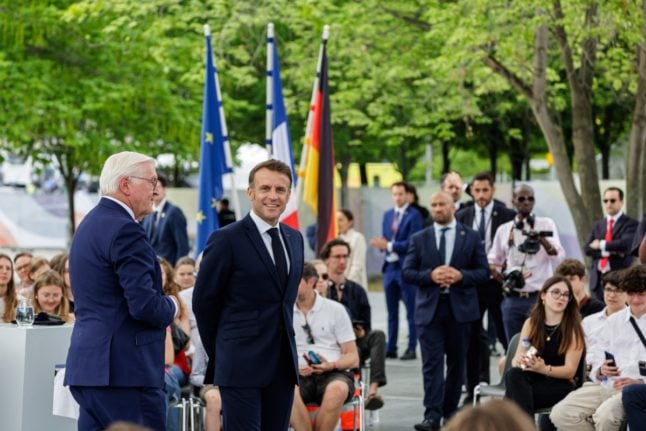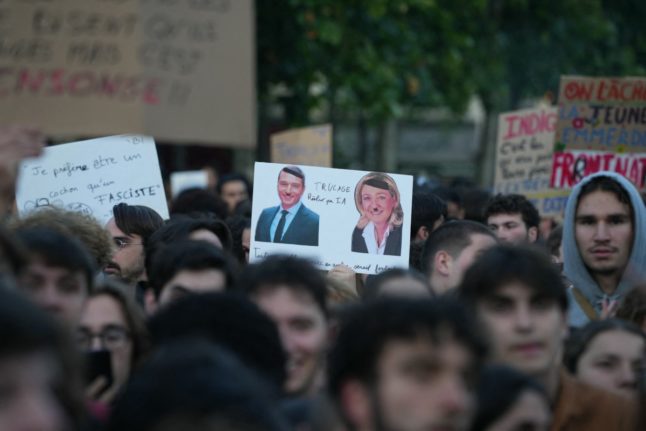Macron made an appearance at a democracy festival his first stop, where, accompanied by German President Frank-Walter Steinmeier, he warned of a “form of fascination for authoritarianism which is growing” in the two major EU nations.
“We forget too often that it’s a fight” to protect democracy, Macron said.
If the nationalists had been in power in Europe in the last years, “history would not have been the same”, he said, pointing to decisions on the coronavirus pandemic or Russia’s invasion of Ukraine.
“We need an alliance of democrats in Europe,” said Steinmeier.
Macron “has rightly pointed out that the conditions today before the European elections is different from the previous election, a lot has happened”.
‘Europe is mortal’
The trip comes two weeks ahead of European elections where polls show, in a major potential embarrassment for Macron, that his coalition is trailing well behind the far right and may struggle to even reach third place.
In Germany too, all three parties in Chancellor Olaf Scholz’s coalition are polling behind the far-right AfD in surveys, despite a series of scandals embroiling the anti-immigration party.
In a keynote address on foreign policy last month, Macron issued a dire warning about the threats to Europe in a changing world in the wake of Russia’s 2022 invasion of Ukraine.
“Our Europe, today, is mortal and it can die,” Macron said. “It can die and this depends only on our choices.”
Ramping up his warning in Berlin, Macron urged Europeans “to go vote for the party that we back and a party that defends Europe”.
After the talks with Steinmeier in Berlin on Sunday, Macron is due to bring his message to Dresden in the former East German Saxony state, where the AfD has a strong supporter base.
Tuesday sees Macron in the western German city of Munster and later in Meseberg, outside Berlin, for talks with Scholz and a Franco-German joint cabinet meeting.
READ ALSO: European elections: The 5 numbers you need to understand the EU
‘Awkward’
Beyond making joint calls for the European elections, Macron’s three-day visit will seek to emphasise the historic importance of the post-war relationship between the two key EU states, as France next month commemorates 80 years since the D-Day landings that marked the beginning of the end of German World War II occupation.
But all has not been smooth in a relationship often seen as the engine of the EU, and German officials said to be uneasy at times about his often-theatrical style of foreign policy.
In a question-and-answer session on social media with young people this month, Macron enlisted help from Scholz when asked if the Franco-German “couple” was still working.
“Hello dear friends, long live French-German friendship!” Scholz said in French in a video on Macron’s X feed. “Thank you Olaf! I very much agree with you,” Macron replied in heavily accented German.
Officials from both sides are at pains to emphasise that while there are periodic tensions on specific issues, the fundamental basis of the relationship remains sound.
But Macron’s refusal to rule out sending troops to Ukraine sparked an unusually acidic response from Scholz that Germany had no such plans. Germany also does not share Macron’s enthusiasm for a European strategic autonomy less dependent on the United States.
“The Franco-German relationship is about disagreeing and trying to find ways of compromise,” said Helene Miard-Delacroix, specialist in German history at the Sorbonne university in Paris.
Mujtaba Rahman, managing director for Europe at risk analysis firm Eurasia Group, said relations between France and Germany “remain awkward, verging on hostile”.
“On the big issues, little progress should be expected,” he said on X.
While Macron is a frequent visitor to Berlin, the trip is the first state visit in 24 years following a trip by Jacques Chirac in 2000 and the sixth since the first post-war state visit by Charles de Gaulle in 1962.



 Please whitelist us to continue reading.
Please whitelist us to continue reading.
Member comments